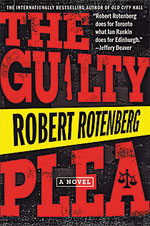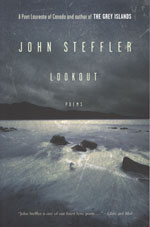
Robert Rotenberg’s debut novel, Old City Hall stirred delighted buzz and garnered warmly welcoming reviews from Canadian crime fiction circles and fans in early 2009. When the first foray is that good, establishing a pace, personality, setting and cast of characters that readers quickly become keen to revisit, two years feels like a long time to wait for the next installment.
The wait is over, and those waiting will feel well rewarded. Rotenberg has delivered another solidly crafted, engaging narrative with the right balance of primary and secondary (new and previously introduced) players, and diverting but not excessive or distracting subplots (that leave the possibility of being further explored in future books).
The plot of The Guilty Plea focuses on the case of Terrance Wyler, youngest son of a family in the high-end grocery business. He’s found stabbed to death in his luxurious home the morning of what was to have been the start of his and wife Samantha’s divorce trial, made sensational by the fact that he has taken up with a notorious Hollywood actress. That morning, Samantha arrives at her lawyer’s office with a kitchen knife that is undeniably the murder weapon. In what is perhaps becoming a signature modus operandi, Rotenberg presents a much too obvious resolution and then proceeds to take it apart and take the reader along for an engrossing, often surprising reassembling of the real story.
The Guilty Plea is seasoned with artful passing references to Old City Hall, and reconnects again with Detective Ari Greene, police officer Daniel Kennicott, Crown attorney Jennifer Raglan and other previous characters. However, The Guilty Plea can likely be enjoyed with no familiarity with its predecessor. This second novel is almost as crisply paced as the first, although it grows ever-so-slightly sluggish a little over halfway through, and then gets firmly back on track.
Once again, while The Guilty Plea offers up an intriguing and consistently sympathetic cast that interacts in interesting and compelling ways, the most vibrant cast member is still the city of Toronto. Seen in sensorily evocative moments across all seasons (the opening scene in the doldrums of sultry August is especially memorable), and in everywhere from coffeeshops and restaurants to landmark buildings and cemeteries, Rotenberg proves a mastery of establishing a sense of place even more impressive than his skills with plot and character. The fact that Rotenberg heads out into the city to write, rather than exclusively cloistering himself in an office or cottage retreat to write, has paid off in terms of his stories’ atmospheric authenticity.(1)
Ultimately, The Guilty Plea culminates in an untidy but not implausible resolution. It’s therefore pretty lifelike. It’s also therefore infinitely book-club-debate-worthy or just individually ponderable – all not bad things at all, especially to pass the time during the wait for the next thoughtfully forged installment in Rotenberg’s increasingly formidable franchise.
Notes
1. Robert Rotenberg: In search of a public place to write
http://arts.nationalpost.com/2011/05/23/robert-rotenberg-in-search-of-a-public-place-to-write/
and
Robert Rotenberg: Writing about real places
http://arts.nationalpost.com/2011/05/27/robert-rotenberg-writing-about-real-places/
Thank you to Simon & Schuster Canada and the author for providing a review copy of The Guilty Plea, by Robert Rotenberg.

